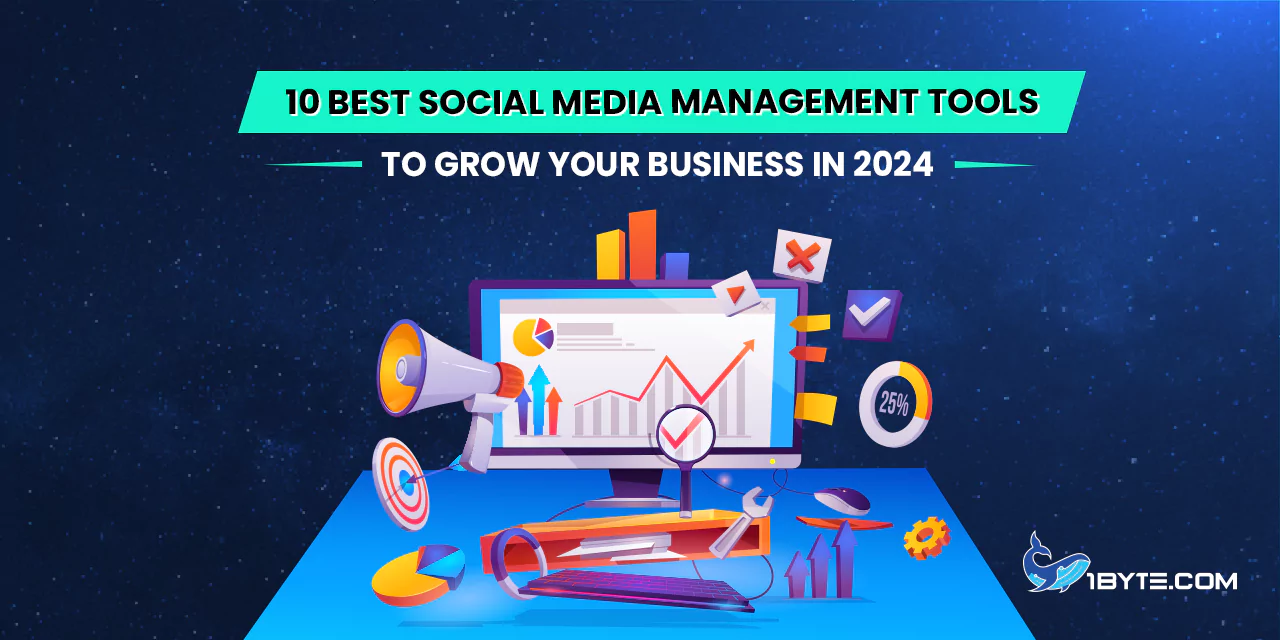Social media management tools are essential for businesses looking to grow their online presence in 2025. When you consider that billions of people now use social media, it’s no wonder that earning people’s attention is difficult. For a start, effective management tools can streamline your process of posting, scheduling and managing analytics to aid your interactions with your audience. This article from 1Byte will explore the 10 best social media management tools to help your business thrive in 2025.
Criteria for Choosing the Best Tools
Choosing the best social media management tools is crucial for growing your business in 2025. With so many social media users, over 5.17 billion, businesses need tools that can work with multiple platforms. The social media app market is expected to grow at a 26.2% compound annual growth rate (CAGR) from 2023 to 2030, reports Forbes. This shows why it is important to choose tools providing built–in features and analytics.
When evaluating social media management tools, consider factors such as ease of use, integration capabilities, and the ability to track key performance indicators (KPIs). For example, Sprout Social provides a very robust analytics and reporting suite of features that many businesses choose. Moreover, with the help of tools such as Hootsuite and Buffer, automation and scheduling, along with publishing options are made so simple.

FURTHER READING: |
| 1. Top 10 Digital Marketing Services for Small Business Success |
| 2. How to Start an Online Store from Scratch |
| 3. 5 Ecommerce Business Plan Templates to Craft Your Success |
User-friendly interface
When selecting social media management tools, a user-friendly interface is crucial. Ease of use guarantees that anyone who is not a technology wiz is able to run their social media with ease.
According to recent statistics, 68% of social media users prefer navigable social media platforms. This highlights the importance of intuitive design in social media management tools. Just to name a few, Hootsuite is commended for having a simple interface so you can schedule posts, manage multiple accounts, and have an overview of your performance all at the same place.
G2 reports that when tools are easy to use, user satisfaction increases. According to the study by Sprout Social, 80% will be able to continue using the tool as long as there’s an easy interface.
Scheduling capabilities
Choosing the best social media management tools involves looking closely at scheduling capabilities. A reliable tool should also have some mechanism to plan and automate posts, or at least on multiple platforms, to minimize inconsistencies. It frees up focus for other strategic wherewithals.
Research shows that 87% of marketers saw a growth in sales leads after implementing video marketing, making it important to reserve space in your calendar for video content. Social media users are on average on six or seven platforms per month, meaning multi platform scheduling is essential.
Integration options
Choosing the best social media management tools involves considering how well they integrate with other platforms and systems. Seamless operation with maximum efficiency requires the use of integration. Here are some key integration options to look for:
Website Integration
Social media management tools should integrate with your website to enable features like social sharing buttons and live feeds. It drives traffic on your site and increases user engagement.
Email Marketing
You can create one cohesive campaign that spans across social media and email thanks to integration with email marketing platforms. For example, Mailchimp integrates with Hootsuite to make the job easier.
Customer Relationship Management (CRM)
Linking your social media tools with the CRM software is the proper way to manage customer interaction. For example, Zoho Social provides CRM integration on top of tracking customer sales and engagement.
E-commerce
For businesses selling products over the internet, the integration with e commerce platforms is crucial. To help you get started, there are tools like Buffer and Sprout Social that integrate with platforms like Shopify or WooCommerce and allow you to manage social media promotions and track sales all from your own social media dashboard.
Analytics and Reporting
Analytics tool integration gives you great insight into your social media performance. Sprout Social and Hootsuite also have robust reporting tools that allow you to monitor the success of campaigns and gain insight into what decisions should be made.
Customer Service
Integrating social media management tools with customer service software allows you to handle customer queries and complaints efficiently. For example, Hootsuite lets you manage customer support through social media channels, such as using Zendesk as an add on.
Content Management Systems (CMS)
As you might expect, integration with CMS platforms like WordPress is assured, meaning that whatever social media posts you make are all aligned with your website content. The beauty of plugins like SocialSnap and Shareaholic is that they make it easy to add social sharing buttons to your WordPress website.
Project Management
If you’re working on multiple projects, it will also integrate with project management tools like Asana or Trello, making it easier to streamline your workflow and collaborate with teammates.
Influencer Marketing
Influencer marketing platforms can be integrated to make managing influencer campaigns better. If you use tools like Hootsuite or Sprout Social, you could use features to measure the impact of how an influencer collaboration with your brand has performed.
Messaging Apps
You are able to connect with customers in a meaningful way by directly messaging through their favorite communication channels like WhatsApp and Messenger.
The consideration of these integration options can help you select a social media management tool that will complement your business needs and better support your entire marketing strategy.
Top 10 Social Media Management Tools Right Now
Hootsuite is a leading social media management tool that helps businesses manage their social media presence efficiently. It offers a comprehensive suite of features, including scheduling posts, monitoring social media activity, and analyzing performance metrics.
Hootsuite
As of 2024, Hootsuite continues to be a top choice for businesses of all sizes. According to recent reports, Hootsuite supports over 1.8 million businesses worldwide. The platform has also expanded its integrations, now supporting more social networks than ever before, including TikTok and Pinterest.
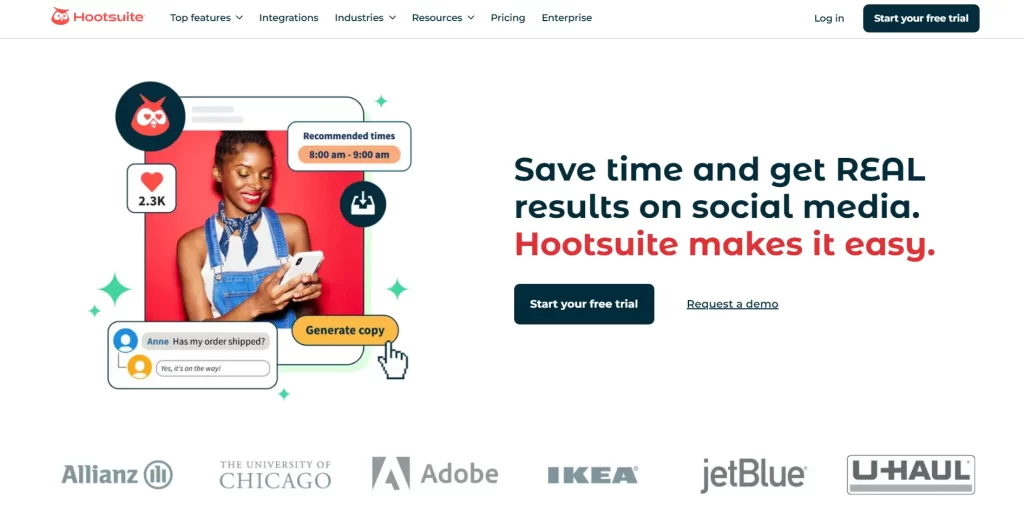
Hootsuite still remains a great choice for businesses of all sizes by 2024. Recent reports indicate that Hootsuite helps more than 1.8 million businesses worldwide. In addition to that, the platform has also increased the number of social networks they are able to integrate with, including TikTok and more.
Pros & Cons
Pros
- Comprehensive Management: Users are able to control several social media accounts through one dashboard.
- Scheduling: It also allows users to schedule posts in advance, keeping social media activity consistent.
- Analytics: Businesses are able to track their performance and ROI thanks to detailed analytics and reporting features Hootsuite boasts.
- Integration: It comes along with supported integrations with tools such as Canva and Grammarly, which improves content creation and quality.
- Unlimited Posts: It works for high frequency posting needs as all plans come with unlimited posts.
Cons
- Cost: Pricing from $99 per month makes Hootsuite expensive compared to small businesses and solo entrepreneurs.
- No Free Plan: In 2023, Hootsuite stopped offering the free plan, which may scare off new users.
- Support: Hootsuite’s support team has been reportedly slow to respond to some users.
- Limited Instagram Tracking: Hootsuite supports Instagram but its capabilities aren’t as robust as other tools.
Buffer
Buffer is a popular social media management tool that helps businesses and individuals streamline their social media activities. It offers a range of features, including scheduling posts, analyzing performance, and engaging with audiences.
In recent years, Buffer has enjoyed considerable growth. Users on their website report a 269% increase in engagement, and a 2x increase in followers. Buffer’s impressive stats show how they have been able to help people grow their social media existence.
Pros & Cons
Pros
- User-Friendly Interface: Because Buffer is intuitive, it provides users with no choice but to find themselves navigating and to manage their social media accounts.
- Multi-Platform Support: A wide variety of social media platforms are supported including Instagram, Facebook, Twitter, and LinkedIn.
- Analytics and Reporting: With detailed analytics and reporting tools, Buffer helps users measure their performance and make data driven decisions.
- Collaboration Tools: Buffer is great for teams, you can get its collaboration features and make this work on a single account.
Cons
- Limited Free Plan: However, with the free plan, the number of features is restricted and perhaps not wide enough for a large business or an agency.
- Cost: Buffer is affordable, however the price can certainly start to add up for businesses with multiple accounts or high usage needs.
- Learning Curve: Buffer offers a large number of features and tools that may take some users a while to fully understand how to use them all.
Sprout Social
One of the top social media management tools is Sprout Social, which lets businesses streamline their social media online activities. Sprout Social provides a full set of features such as scheduling, analytics, customer engagement and influencer marketing. Designed to help brands manage their social media presence through more than one platform more efficiently.
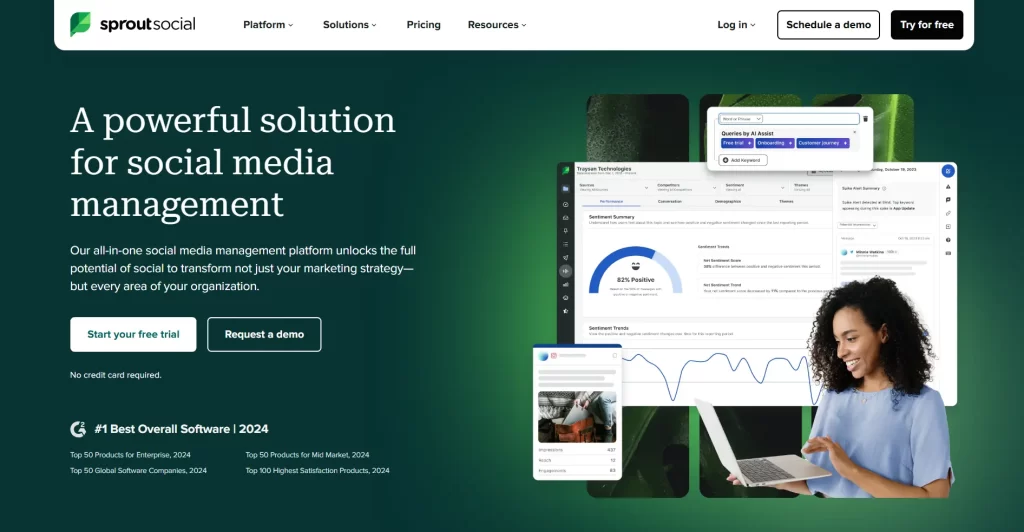
Pros & Cons
Pros
- Comprehensive Features: It brings along a range of tools for the scheduling, analytics, customer engagement and influencer marketing.
- User-Friendly Interface: The UI is easy to navigate so that everyone, from all skill levels, finds it easy to use.
- Integration Capabilities: Can integrate with major social media platforms as well as other business tools.
- AI-Powered Insights: AI driven insight to optimize your social media strategies.
Cons
- Cost: It can be expensive, too, especially for small businesses or startups.
- Learning Curve: However, some features may take you time to learn and fully utilize.
- Limited Free Plan: The features available are limited and you need to go for the paid plan in order to enjoy the full functionality.
Zoho Social
Zoho Social is one of the many social media management tools that make it easier to manage social media marketing. The platform also provides a lot of features that enable businesses to monitor engagements, schedule posts, analyze performance and manage several social media accounts. Zoho Social helps you to create, publish and promote content across all the platforms such as Facebook, Instagram, Twitter, LinkedIn and others.
Pros & Cons
Pros
- Multi-Platform Management: All your social media accounts in one place.
- Scheduling: You can schedule your posts in advance so to always have a presence on social media.
- Analytics: Get detailed analytics to monitor the performance of your posts and campaigns.
- Collaboration: Share calendars and task assignments to facilitate team collaboration.
- AI Assistant: For generating the captions and hashtags you can use Zia, the AI assistant.
Cons
- Learning Curve: Can take some time to learn to do everything.
- Cost: Higher price point compared to some other social media management tools.
Later
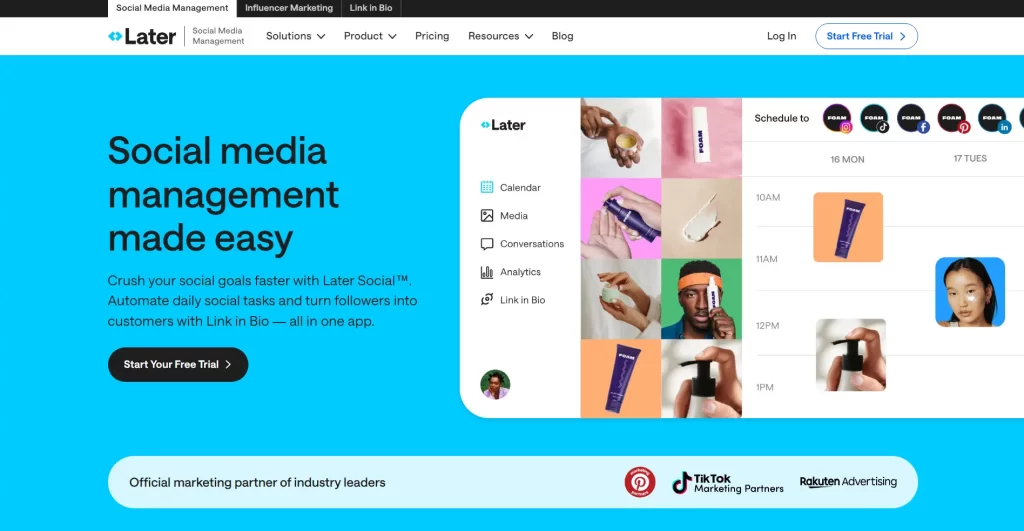
Later is a social media management tool that, through its use of an intuitive design along with a simple, easy to use interface, sets itself apart from similar tools out there. Small businesses and those with individual creator accounts specifically love it because it makes social media scheduling and content planning a whole lot easier.
Pros & Cons
Pros
- User-Friendly Interface: It is very easy to navigate irrespective of the level of expertise.
- Visual Content Planning: Enables users to visually plan and preview their content.
- Multi-Platform Support: Has Instagram, Facebook, Twitter and Pinterest scheduling to post as easily as you please.
- Collaboration Features: It enables team collaboration and approval processes.
Cons
- Limited Analytics: Does not have the advanced analytics of some competitors.
- Higher Cost: It can be more expensive than other basic scheduling tools.
- Less Automation: A little less automation than you’ll see with tools like Hootsuite or Buffer.
Agorapulse
This is a powerful social media management tool for businesses to streamline the social media activities. Agorapulse allows us to schedule posts, monitor social media interactions as well as generate detailed reports. Additionally, Agorapulse helps users save time and stay organized, across multiple social media accounts from a single dashboard.
Pros & Cons
Pros
- Centralized Dashboard: Will manage all social media activities in one place.
- Post Scheduling: Post to multiple platforms in advance of when you post.
- Team Collaboration: Let people work together with shared calendars and workflows.
- Detailed Reporting: Measure your social media performance with actionable reports.
- Customer Support: Customer support that’s award winning, as well as industry leading features.
Cons
- Cost: This costs more than some other tools.
- Learning Curve: May take time to get used to many features.
- Limited Free Plan: The paid plans provide more than what the free plan can provide.
Sendible
Sendible is a powerful social media management tool designed to help businesses and agencies streamline their social media efforts. It offers a comprehensive suite of features, including content scheduling, monitoring, and reporting, making it easier for users to manage multiple social media accounts from a single dashboard.
Pros & Cons
Pros
- User-Friendly Interface: Sendible’s userfriendly design ensures users have a easy time when navigating through and managing their social media activities.
- Content Library: Users can also use the tool which comes with a content library to store and organize content effectively.
- Automated Reports: It generates automated reports, so users do not lose time filling out reports and they will never miss a report deadline.
- Multi-Platform Support: It is compatible with many social media platforms, including Facebook, Instagram, Twitter, LinkedIn and many others.
- Collaboration Features: Rigorous collaboration features on Sendible allow teams to work in sync.
Cons
- Cost: Sendible can be more expensive compared to some other social media management tools.
- Learning Curve: Some users may find it takes time fully to exploit all of its features but it is user friendly.
CoSchedule
CoSchedule is a comprehensive social media management tool that jumps us into your marketing. It gives you a superb social calendar, enabling you to build, schedule, publish and calculate your social media schedule in one place. CoSchedule offers features such as drag and drop rescheduling, social message optimization and automated poster scheduling to keep your social media channels current.
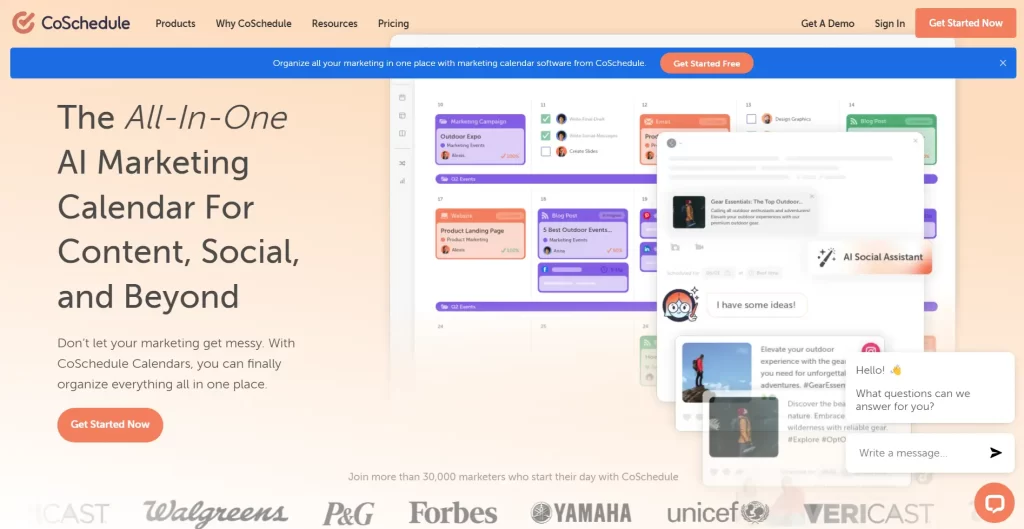
Pros & Cons
Pros
- All-in-One Tool: Because of this, CoSchedule integrates with marketing tools, handling social media, content and campaigns for you.
- AI-Powered Features: It has social message optimisation in addition to automated scheduling thanks to its AI powered features.
- Customizable Calendars: It allows you to create and customize many calendars for different social media platforms and campaigns.
- Detailed Analytics: If you want to track the performance of your social media efforts, CoSchedule provides some really in depth analytics.
Cons
- Learning Curve: However, this one is loaded with features, so it will take you some time before you master it.
- Cost: While effective, CoSchedule can be on the pricier side compared to other social media management tools.
MeetEdgar
A powerful social media management tool for businesses, MeetEdgar lets you streamline multiple social media efforts. They have a full range of features that help make scheduling, publishing, viewing and analyzing content simpler and a lot more efficient.
Pros & Cons
Pros
- Time-saving: It automates content scheduling and repurposes your evergreen posts.
- User-friendly: It has a simple dashboard and easy to learn interface.
- Content library: It can store an unlimited amount of content for future use.
- AI assistance: Edgar’s AI sidekick Inky assists in producing interesting content.
- Multi-platform support: Posts across many social media accounts are managed.
Cons
- Limited free plan: Some of its most advanced features are available only with a paid subscription.
- Learning curve: May not fully utilize all features easily.
- Integration limitations: Not all integrations will be as seamless as others.
Loomly
Loomly is a social media management tool, geared towards making content creation, scheduling, and collaboration, as painless as possible for businesses of all sizes. After launching in 2016, Loomly has grown to become a marketer’s favorite for its simple interface and wide range of features.
Pros & Cons
Pros
- User-friendly interface.
- Comprehensive features for content creation and scheduling.
- Supports collaboration with team members.
- Detailed analytics to track performance.
- Integrates with multiple social media platforms.
Cons
- No free plan available.
- Some users find the reporting features lacking in audience insights.
Leverage 1Byte’s strong cloud computing expertise to boost your business in a big way
1Byte provides complete domain registration services that include dedicated support staff, educated customer care, reasonable costs, as well as a domain price search tool.
Elevate your online security with 1Byte's SSL Service. Unparalleled protection, seamless integration, and peace of mind for your digital journey.
No matter the cloud server package you pick, you can rely on 1Byte for dependability, privacy, security, and a stress-free experience that is essential for successful businesses.
Choosing us as your shared hosting provider allows you to get excellent value for your money while enjoying the same level of quality and functionality as more expensive options.
Through highly flexible programs, 1Byte's cutting-edge cloud hosting gives great solutions to small and medium-sized businesses faster, more securely, and at reduced costs.
Stay ahead of the competition with 1Byte's innovative WordPress hosting services. Our feature-rich plans and unmatched reliability ensure your website stands out and delivers an unforgettable user experience.
As an official AWS Partner, one of our primary responsibilities is to assist businesses in modernizing their operations and make the most of their journeys to the cloud with AWS.
Conclusion
The social media landscape is continuing to evolve at the rapid pace of 2024. With over 5.17 billion users worldwide, businesses must leverage social media management tools to stay competitive. In addition to helping you schedule and publish content more efficiently, these tools also give you great insight into what is engaging your audience, and how your content is performing. Hootsuite & Sprout Social still top off for their impressive features and easy use.
Recent reports have shown how important video content becomes in people’s lives these days — 44% of people prefer to learn about new products through short videos. Buffer and Loomly are great tools that help you automate posts on videos as well as help increase reach. And beyond it, the emergence of platforms like TikTok alone means that a multi channel approach is required.
By adopting the right social media management tools, businesses can enhance their online presence, engage with their audience more effectively, and drive significant growth.

